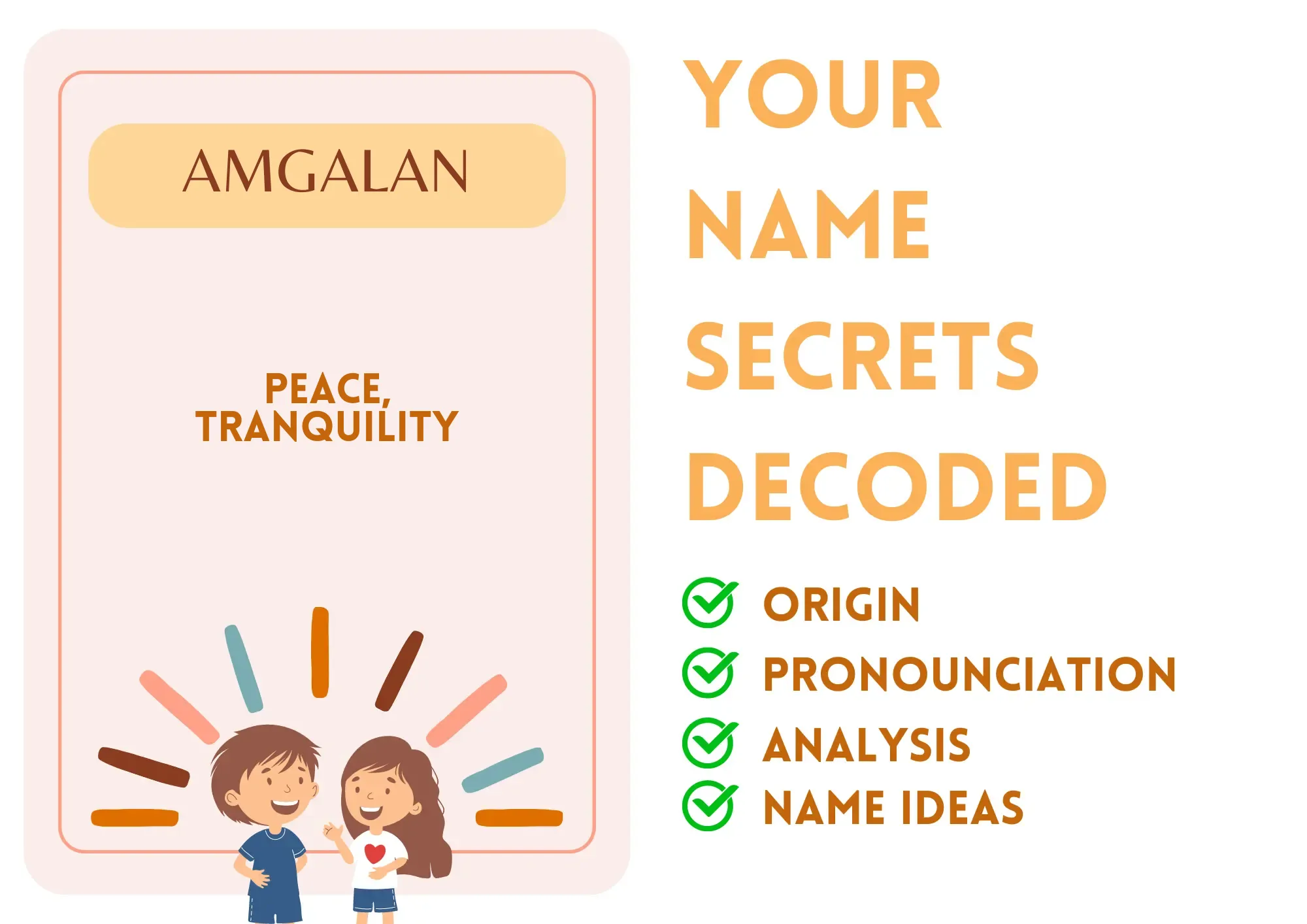
Amgalan
Amgalan is a serene and culturally significant name of Mongolian origin, meaning "peace" or "tranquility." Traditionally used in Mongolian and Central Asian regions, it is a unisex name that embodies calmness and harmony. Reflecting Mongolia's rich cultural heritage, it conjures a sense of spiritual balance and inner peace, making it a cherished name choice for parents looking for names with a soothing essence.
Amgalan is positively perceived, often evoking feelings of relaxation and contentment. It is relatively straightforward to pronounce and write, with rare variations or misspellings. Common nicknames include Amga and Ami.
Although not widely represented in popular culture, the name Amgalan resonates with those who appreciate names with profound meanings and cultural roots. It is celebrated for its harmonious qualities and evokes a sense of tranquility and balance, making it a distinctive choice for new beginnings.
Basic Information
Gender: Unisex
Sounds Like: AM-gah-lan
Pronunciation Explanation: The emphasis is on the first syllable "AM", followed by a soft and gentle "gah-lan".
Summary and Meaning
Meaning: peace, tranquility
Origin: The name Amgalan has its origins in Mongolia, reflecting the cultural and philosophical emphasis on peace and tranquility.
Usage: Amgalan is a unisex name, traditionally used for both boys and girls in Mongolian culture.
Name Number (Chaldean)
Name Number (Pythagorean)
Popularity (Global Rank)
Overall: 89980
Boys: 72681
Girls:
Most Popular in
Religious and Cultural Significance
Religion: N/A
Background: While not directly tied to a specific religion, the concept of peace is universally significant and is shared across many spiritual and philosophical traditions in Mongolia.
Cultural Significance: The name Amgalan is esteemed in Mongolian culture for its embodiment of peace and tranquility. It mirrors the philosophical focus on harmony found in Mongolian traditions and the serenity of the country's vast landscapes.
Historical Significance: There are no specific historical figures named Amgalan, but the concept of peace is deeply ingrained in Mongolian history and aligns with the cultural philosophy of living harmoniously with nature and others.
Popular Culture
Literature and Mythology: While Amgalan is not commonly found in mainstream global literature or mythology, it may appear in regional stories or folk tales celebrating peace.
Movies and Television: The name may appear in Mongolian cinema or television, reflecting themes of tranquility and cultural heritage.
Feelings and Perceptions
Perception: Amgalan is generally viewed favorably, associated with feelings of peace, calm, and balance. It is seen as a spiritual and evocative name.
Positive Feelings: Serene, soothing, peaceful, balanced, culturally rich.
Negative Feelings: Might be unfamiliar to those outside Mongolian culture, leading to potential difficulties in pronunciation.
Practical Considerations
Ease of Writing and Calling: Amgalan is relatively easy to write and pronounce, consisting of seven letters and three syllables. It has a melodious quality that is gentle on the ear.
Common Typos and Misspellings: Amgalin,Amgalen,Amgallan
Common Nicknames: Amga,Ami,Gala
Amgalan Popularity
Amgalan Usage and Popularity By Country
| Country | Rank (Overall) |
|---|---|
| Mongolia | 119 |
| Russia | 6836 |
| Hungary | 19137 |
| Ireland | 23749 |
| Japan | 26195 |
| Sweden | 31840 |
| Germany | 51089 |
| Canada | 96992 |
| Australia | 105589 |
| France | 158953 |
Amgalan Usage and Popularity By City
| City | Rank (Overall) |
|---|---|
| Washington | 24818 |
Compatibility Analysis
Famous Persons Named Amgalan
Related Names
Similar Sounding Names:
Aman,Amalia,Amara,Aslan